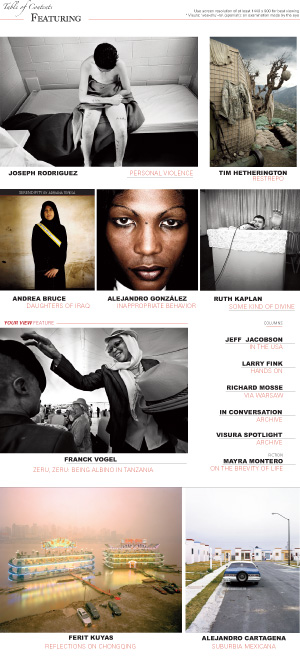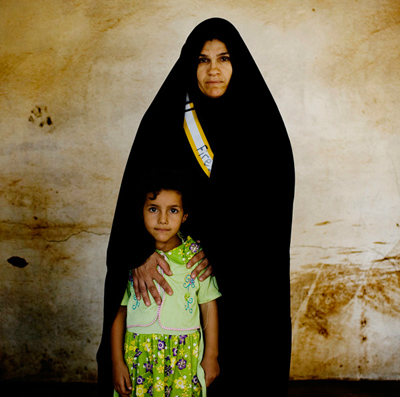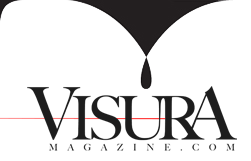
JEFF STOCKBRIDGE | Philadelphia
Philadelphia is both dead and alive at the same time. The city is home to approximately 60,000 abandoned properties, nearly half are empty row homes located in North Philly.

ERIC PERRIARD | Fascinations
I was born in Korea, left at the age of six as an adoptee, and came back more than twenty years later. Korea surely triggers inspiration, but more importantly, I feel very close to its landscapes and colors. This relationship with South Korea has an impact on my vision: I see this land with exoticism even though I am related to it, and nothing in Korea ever becomes boring to me. One aspect of this exoticism, which captivates me more so than others is the contemporary chaos of Korea.

Letter to the reader, Issue 10
Issue 10
There are days when you feel a sense of spiritual entrapment that pervades your entire being. During these times, it seems as if there is no open door. Although you see possibilities, you cannot recognize them as opportunities. Instead, the obvious solution becomes the only answer, and it tends to be the one unattainable fix.
ALEJANDRO GONZALEZ | Inappropriate Behavior
Issue 10
This series is an inventory of individuals subject to rejection or exclusion based on their sexual preferences. It is a denunciation of homophobia. Symbolically it is also a call to respect differences—political, ideological and religious. Homophobia is not exclusive to Cuban society. “It is curious and even surprising that a revolution such as the Cuban revolution, which set out to eradicate the hereditary social structure and create a new social ethic, would, in turn, passively inherit homophobia from the previous society.”
TABLE OF CONTENTS | Issue 10
Issue 10
FeaturingJoseph Rodriguez
Tim Hetherington
Andrea Bruce
Alejandro Ganzález
Ruth Kaplan
Jeff Jacobson
Larry Fink
Richard Mosse
the In Conversation Series
Mayra Montero
Frank Vogel
Ferit Kuyas
Alejandro Cartagena

ANDREA BRUCE | Serendipity
Issue 11
The Daughters of Iraq are women who have been widowed by the violence in Iraq since 2003. Hired government officials, they provide security at checkpoints and use the income to support their families. In their villages this job is the only socially acceptable way for widows to earn an income, keeping them from prostitution and desperation.
TIM HETHERINGTON | Restrepo
Issue 10
Outpost Restrepo lay at the furthest point of American control in Afghanistan’s unruly Korengal Valley. It clung to the rugged mountainside, protected on one side by a steep rock wall and commanding view and was manned by the men of Second Platoon, Battle Company of the 173rd Airborne. I arrived in the valley with the author Sebastian Junger in September 2007, on assignment for Vanity Fair while the world’s gaze was still firmly centered on events in Iraq.
RUTH KAPLAN | Some Kind of Devine
Issue 10
I AM NOT SURE WHAT INITIALLY LED ME to photograph churches since my interest in religion has always been minimal. My father had a feeling for religion and tradition which was deep in his core, and meaningful and enriching to his life. My mother would observe the holidays, but lived as a practical, social woman, rooted in the day-to-day with no interest in transcendence. Her father and two brothers were killed in the Holocaust and her mother had died a few years earlier. After the Nazis came into power in Lithuania, she spent the war in the concentration camp Stutthof, as part of the slave labour forces. Though they believed in tradition, my parents never imposed religious views on my sister or me.
RICHARD MOSSE | Via Warsaw
Issue 10

MAYRA MONTERO | On the Brevity of Life
Issue 10
There is a small staircase that leads to the sea, and she usually goes down it slowly, wrapped in a long terrycloth robe with the hem dragging in the sand. She is ageless, or she is as old as one wants to imagine. The skin on her athletic thighs and her strong arms has not stretched much: it sags there, and also on her chest and around her neck. It is not simply a matter of wrinkles: these are the folds of eternity. Lana is very old.
JEFF JACOBSON | In the USA
Issue 10
Beckie's Sculpture, Amherst, Ma. 2010
JOSEPH RODRIGUEZ | Personal Violence
Issue 10
I began photographing gangs in Los Angeles in 1992. I saw Los Angeles as the postmodern wild west, a land governed by the gun. It was an uncontrolled and scary place, a land of dreams and beauty, playing by its own rules. In 1993, I continued photographing gang life in East Los Angeles. My aim was to get to the core of violence in America, not just the physical violence against one another, but also the quiet violence of letting families fall apart, unemployment, our educational system, and the violence of segregation and isolation.
FRANCK VOGEL | Zeru, Zeru: Being Albino in Tanzania
Issue 10
AROUND LAKE VICTORIA, Tanzania, evil acts are driven by the belief that albino body parts possess magical powers, which bring wealth if used in potions produced by local witchdoctors. Most clients are rich businessmen, impatient to extract more gold from their mines, or politicians, eager to be elected into office. Since 2007, official reports indicate that over 54 people with albinism have been brutally murdered; their body parts hacked off and sold for large amounts of money: $2,000 for a leg or an arm, and $10,000 for a whole albino body.
FERIT KUYAS | Reflections on Chongqing
Issue 10
MY FIRST VISIT TO CHINA was in 1997 when I went to photograph the “World Elevator” fair in Shanghai. From that moment, I felt at home in China. One year later in September 1998, I met my future wife. When we went to visit her family, I saw Chongqing for the first time. This was the starting point for City of Ambition. My first impression of Chongqing was a heat and brightness so strong that it hurt my eyes. My wife and I were only able to visit my in-laws in the city during summers, which are hot and humid. I was deeply impressed by the drama of the place itself: three dimensional, hilly, very busy, construction sites everywhere, and two huge rivers blending in the middle. I immediately knew I would photograph there.




